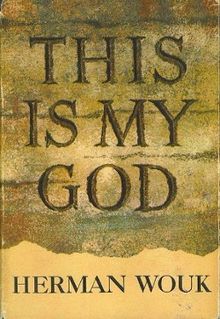In the process of researching a new article-maybe-book, a down-the-rabbit-hole investigatory thread emerged. The origin of the thread begins with the novelist Herman Wouk (The Winds of War), a 20th century author of deserved literary repute. Mr. Wouk was also an Orthodox Jew, proud and practicing his faith so personally that he wrote a non-fiction text “This is My God.” His book is a well-written introduction to a Jewish theistic God concept, which is an accessible recommended read. In his introduction, Mr. Wouk explains that his book is in response to a derogatory text promoting agnosticism. The hunt began.

The book that invokes Herman Wouk’s ire has almost disappeared from library shelves in the first decades of the 21th century; in contrast, Mr. Wouk’s book is still in print and easily available. Homer W. Smith was a biologist in the first half of the 20th century who wrote three books of some publishing success. The third was “Man and His Gods,” published in 1955 and running at 485 pages before the index. However, what makes the book stand out is that the Forward is written Albert Einstein. The book sold well in its day.
As Dr. Einstein stated, Professor Smith attempts “to portray man’s fear-induced animistic and mythic ideas with all their far-flung transformations and interrelations.” One of the major arguments of the book is that Western religions are a magnet for all destructive fears that have haunted humankind. Further, these religions are also a significant broadcaster of these pernicious narratives that promulgate terrible results such as war and widespread unhappiness. The book is a thoroughgoing condemnation of religion and its application up through the beginning of the 20th century.
One can clearly understand why Herman Wouk despised this text.
There is no doubt that Professor Smith was extraordinarily well-read. Besides the Bible and biblical scholarship, he was intimately familiar with Enlightenment philosophers, the volumes of Gibbon’s “The Rise and Fall of the Roman Empire,” Darwin along with his milieu of detractors and supporters, Medieval magic and literature on the Devil, literary criticism, Christian theology and metaphysics. He saves some of his highest praise for the eleventh edition of Encylopedia Britannica, published in 1910-1911. (p. 483)
“Man and His Gods” is an archetypal text of its time. The writing is long-winded, and the grammar is complex, which was typical of the academic presentation of the day. Reviewers of that decade would declare that the book was erudite and well-written, whether or not they agreed the provocative argument.
The thesis is that knowledge and rationalism trump religion and superstition. Most of the text is a review of the religions of Western world and the Ancient Near East through history using the lens of 20th century rationalism. Professor Smith hoped to put the final nail in the coffin of superstitious religion with this book. He did not.
A funny thing happened though, which is why there was a hunt. “Man and His Gods” has nigh disappeared. In a dash of irony, I believe that the book would have certainly slipped away totally, despite a forward by Einstein, if Herman Wouk had not mentioned the text by name in his introduction. If Mr. Wouk had simply dropped a few sentences explaining his angry motivation for writing his book, time would have accomplished his goal for him.
I went searching for the text. My university lists a copy of Dr. Smith’s text in its catalogue, having purchased it in 1956. According to their records, the book was never checked out of the library. After I and the university librarian perused the shelf, we both concluded that the book had been stolen, probably decades ago. The Library of Congress (Card no. 52-5512) has a copy, buried in one of their offsite repositories. Having access to an academic national search function, someone located a copy at SUNY-Buffalo. Ten weeks after an initial request, I was holding the book.
The book did not meet my needs though. I was seeking a text that explained and promoted agnosticism in the 20th century. Dr. Smith’s text is the other side of the coin, exclusively attacking theism and orthodox religions. He states that rationalism is the better/best way, yet he offers no arguments for this stance. While the book may have made a splash at the time of publication, this lack of a positive argument may explain why the book disappeared from the great discussions on religion, culture, and individual relevance.
Having read through the book only to find the book only to find disappointment, I am reminded of a quote from the end of Ecclesiastes. “The making of many books is without limit and much study is a wearying of the flesh.” (Eccl. 12:9) Homer W. Smith taught me two lessons: first, erudition easily falls into hubris and second, pre-determined conclusions can produce a myriad of ever-escalating mistakes and misreadings.
Mr. Wouk’s book also taught me a lesson: Anger is a tool and it should never be a reason.